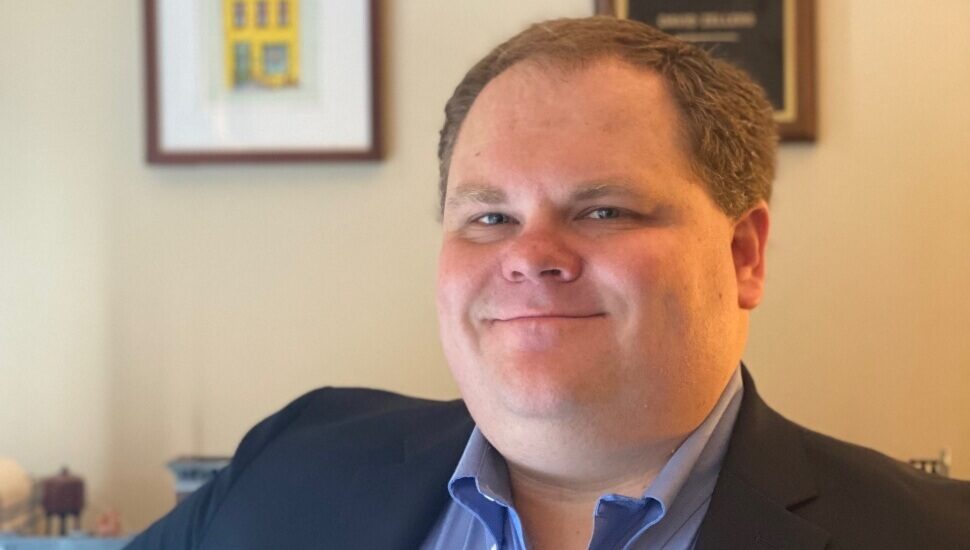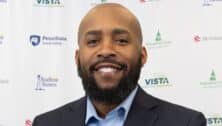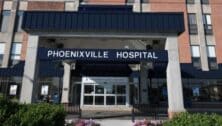Chester County Leadership: David Zellers, Director of Commerce at Montgomery County

David Zellers, Director of Commerce for Montgomery County, spoke with VISTA Today about growing up in Wernersville, Berks County, where he could walk to school, the playground, and his great-grandparents’ house. He also discussed the life lessons he learned from playing ice hockey and the work ethic he got from his dad, who worked his way up from a mill worker to an executive position at the same company.
Then, Zellers talked about how he ended up working at Montgomery County and his economic and workforce development goals in the state’s third largest county. He also shared how his philosophy of connecting different things together influences his work.
Where were you born, and where did you grow up?
I was born the oldest of three children and the only boy in Berks County. I grew up in Wernersville, which is in western Berks County. Really a wonderful community in a beautiful part of Pennsylvania.
What did your parents do?
My dad has been with the same company for over 40 years. It was originally known as Reading Tube. The current name of the company is Cambridge Lee. The company manufactures copper tubing for a variety of uses.
When I was born in 1982, not long after my Dad started there, he was a third-shift worker in their mill. Over the years, through a lot of hard work and persistence and really just being a great guy, he’s now an executive. That’s a pretty remarkable thing when you think about it. He knows his business inside and out, front to back.
My mom was at home with my sister and me when I was very young. Then she became a front-line manager at a local grocery store and is now retired.
What memories do you have of growing up in Wernersville?
We could walk to school when I was young; the building I started elementary school in was the same one my Mom went to elementary school at. My grandmother and my great-grandparents also lived in town in the same house. We lived on the main street in town, and I could walk to great-grandparents house, the playground, the local store, etc.
What sports did you play growing up?
I was an ice hockey player. There are a lot of valuable life lessons in playing ice hockey. So much of being good at hockey is being able to predict where the play is going to go next. You don’t skate to where the puck is. You certainly don’t skate to where it was – you want to go to where the puck will be next. The game is in constant motion, just like life. You also learn how to take a hit and keep going, be aggressive, communicate as a team, and be a leader.
What kind of jobs did you have growing up?
My first job was working at a grocery store. I worked weeknights in the dairy department and did a lot of stocking the shelves, unloading the milk trucks, and things like that. I also worked in what they called being a receiver, where you checked shipments in.
It was interesting work because I started to learn about how things work behind the scenes. I got to know the guys who deliver the bread, the chips, the soda – that there is a world that is awake at 3:00 in the morning. You don’t really see them.
I’m always impressed at learning how something works. How do all the different items in a grocery store come together? That was a perfect educational experience, working at the store.
Where does that natural curiosity come from, David?
Some of it’s just the way I was as a kid. I was always trying to read. I remember we had this set of encyclopedias at home and I would read them, just go through them over and over.
I also played LEGO all the time. I still build LEGO sets as an adult. When you build stuff, you see how things come together and all the parts and how it looks.
I’ve always admired Disney, in terms of how they design things and serve their guests, as well. I joke that my dream job is to be a Disney Imagineer because what they design there is an entire experience. They think about how everything comes together. That’s just fascinating to me.
Where did you get your work ethic?
I’ve always had it. Before I started working in the workforce, around age 12, I was doing yard work at my grandparent’s house to help out. I started doing their Christmas decorations. I still do the Christmas decorations for my grandmother every year – this Christmas, it’ll be 29 years.
We were expected to work in my family if we wanted to get our driver’s licenses and have more freedom. Again, that comes from the example my dad and mom set. My dad, in particular, what he did with the job he had – he had to work hard to move up and grow his career.
What kind of music were you listening to in high school?
I still listen to mostly classic rock. I get that from my dad. Playing ice hockey, there were a lot of places to drive to early in the morning. I couldn’t touch the radio in my dad’s car, so I just listened to what my dad listened to. I like stuff from the 60s and 70s, and some newer stuff as well.
Where did you end up going to college?
I did my undergraduate at York College of Pennsylvania and my graduate education at Miami University of Ohio.
Why York College?
York really came down to two things. One, it was close to home, about an hour away, and I was helping with my granddad at the time – he was still with us but was sick. And York is a very small school, relatively speaking, so most of my classes in my major – I was a political science major – were 10 to 15 kids, if that. I was fortunate there to get that chance to get to know professors.
How did you get from being a political science major into economic development?
It’s funny. I went to college thinking I was going to be a lawyer. Then when I was in college, a professor encouraged me to apply to grad school to work on a master’s and a Ph.D. I did that, and I got into Miami of Ohio. I went there for three years, completed a master’s, and worked through part of a Ph.D. before I left due to illness.
At Miami, I started working with the Center for Public Management and Regional Affairs. That was part of the department there. That was public administration work, local economic development, and things of that nature that exposed me to a world of rolling up your sleeves and doing things. I enjoyed that.
When did you discover you had a passion for economic development?
Well, I think when it comes down to it, so much of political science is about human nature. And the kind of economic development that I champion is really about people and the big picture.
For me, the bridge really was while I was an undergrad. I had a professor, who’s since passed away, whose name was Mel Kulbicki. He would always talk to me about the importance of seeing both the trees and the forest, and that’s what I try and do.
When I talk about being in economic development, I also talk about workforce development and community development. I’m talking about the health of communities, the strength of our education system, the connectedness of our infrastructure, and our region as a whole, and all the things that come together to build a better economy, make better lives for people, and have more robust, more vibrant communities.
What’s so cool about political science, at least the way I was able to study it, is that it’s unbounded in some ways. You have to be able to look at all the angles and make all the connections to fully understand it and make change happen.
Who were the people who saw promise in you and opened doors for you?
There are four professors – Dr. John Altman and Dr. Mel Kulbicki at York College, and Dr. Ryan Barilleaux and Dr. Phil Russo at Miami of Ohio. They each played important and unique roles in my education.
Beyond that, there’s a guy named Jim Becker, the executive director of the Crawford County Economic Progress Alliance. He’s been a tremendous mentor and friend.
Bill Fontana and Julie Fitzpatrick from the Pennsylvania Downtown Center were my last bosses before I came here and are really just two of the most special people in my life. Bill Fontana in particular, has been just an excellent teacher and friend.
What do you think Bill saw in you, David? Why do you think he gave you extra attention?
Bill is just one of those folks – he’s a very gregarious person. We had a small staff at the Downtown Center, which was nice. He and I were usually the first two in the office early, and we had a nice rapport. But he’s always been somebody I admired – he worked hard for a long time, put the work in, and is passionate about it.
What led to you coming to Montgomery County?
It’s a funny story. I was in the running for another job that I turned down. Somebody involved in that interview process sent my resume to Montgomery County and said, “You should talk to this guy.” This was when the county was doing the search for the Director of Commerce in 2017.
I had never met anybody – didn’t know the commissioners past or present then, didn’t know the senior staff. When I had my initial interview, my first question was, “why am I here?” because I hadn’t applied for the job; everyone had a good laugh about that. Lo and behold, they made me the offer, and in August 2017, I started here.
So here we are, 2022, heading into the third quarter. What are the challenges and opportunities you’re focused on?
I’m so fortunate because, in my role, I get to be very strategic in my thinking and my approach. I have a lot of latitude from leadership to focus on things that, again, to some folks, may not seem like economic development in a traditional sense. Still, as I said, everything connects together.
I focus a lot on continually building our capacity. How do we make an economic development and workforce development delivery system here in Montgomery County? We’ve built capacity, but that work is never really done. This is the third largest county in all of Pennsylvania, larger than four U.S. states and the District of Columbia in terms of population, a life sciences powerhouse, home to the most manufacturing jobs in the state, a growing financial center, has a vibrant hospitality and tourism sector, and in a region that is just so important to development and vitality of the Commonwealth on top of so many other things.
It starts with the MontcoForward initiative; we continue to build from what we started a few years ago with programs, partnerships, and new approaches to our work. That gives us a guiding ethos – ensuring Montgomery County is the place to live, work, learn, and invest. MontcoForward is also just one of the components of our most important partnership, the one we share with the Valley Forge Tourism and Convention Board. And that is a partnership that is so critical to our work and continues to grow and evolve; the shared vision, the shared passion, and most of all, the comradery we share, particularly in the most challenging times in the past few years, has been key to keeping me going professionally and personally.
As a leader, I’m focused on how we can keep ahead of the challenges and push the conversations that matter to the forefront whenever I can. We’re in a time of great change, and where things end up with the economy, how people work and live, how companies evaluate investments, and so forth are all unsettled. I ask myself what can we, what can I do to help the county, our partners, our communities, and beyond navigate the changing landscape. That’s how we can turn challenges into opportunities, collaboratively pushing past what has been to develop impactful strategies and smartly deploy resources to make meaningful investments.
When should people reach out to your office, David?
There’s really no wrong reason to reach out; that’s what I want people and businesses to know. To start with the businesses that are here today, call us even if you’re not thinking about anything. Call us to discuss what’s happening in your business right now, what might be on the horizon for you, what’s good, and what’s keeping you up at night.
And the same goes for folks who are looking to come here. Let’s just have that conversation. Let’s start somewhere, and we go from there. Understand the project. Bring all the people to the table that need to be there. It’s like anything in life – the really impactful stuff, it’s not always going to be instant gratification. It’s a process, indeed, but when it’s done right, that process’s rewards are exciting and meaningful.
Is there an aspect of economic development happening in Montgomery County right now you think holds great promise for the future?
The continued boom in life sciences and innovation is exciting here in Montco and for our region. It’s also great to see foreign-based firms, like IKEA, Almac, and Arkema, making new investments in their US headquarters which are located in Montco. And of course, the investment of organizations like AmerisourceBergen, Hamilton Lane, SEI, CHOP, and so many others in our county are exciting. We have in our county the right ingredients to be a bigger presence on the global stage. At the same time, we’re also a place of vibrant communities. Our work with the county’s planning commission advising the municipalities throughout our county on economic development will always hold promise because how people live and how their community is able to thrive is such a core ingredient to all the other potential and promises of economic development in the county.
What do you do with all that free time that you have, David?
I try to visit Berks County as much as possible to see family. I’m lucky I live close to one of our major trails – I try to get out on the trail as much as possible. I do LEGO projects as I noted and I do photography as a hobby. I go to Assateague and Cape Henlopen to do photography and some other places. In May of this year, I took a long trip that allowed me to visit over a dozen national parks and much of the western United States; I’d like to devote more of my free time to travel and satiating my wanderlust.
I still follow ice hockey a bit, picked up watching F1 and the Premiere League like everyone else seems to have during the pandemic, but college football is really my big sports passion. It’s funny – my undergraduate, York College, we didn’t have a football team. Miami of Ohio does, so I keep close tabs on them and a bunch of other teams. I just love the tradition and the passion around college football. I get excited about the big rivalry games. I probably have 20 t-shirts from different college football teams – just something I started collecting over the years.
In a crazy world, David, what gives you hope?
I try to approach things with the temperament of a realist and the heart of a passionate dreamer. I’m an idealistic curmudgeon, I suppose, or something like that. Truth is, the world is and has always been in a state of change with ups and down; I think now we’re just more keenly aware of a broader scope of what is happening and it impacts people. There’s a shared responsibility for leaders to recognize how that broader scope impacts our work and to engage genuinely to create change that benefits the whole. The future is ours to write; I keep myself motivated and hopeful by looking for opportunities where I believe I can make the greatest impact as a leader and as a person, be it at work or with my friends and family.
Finally, David, what’s the best piece of advice you ever got?
I think it’s the advice I mentioned earlier from Dr. Kulbicki. He talked about the importance of seeing both the trees and the forest, which really excited me and still excites me to this day. I’m fortunate – I have been able to do a lot in the past several years with the county.
It has been everything imaginable, including co-chairing the census committee, chairing our “Homes for All” work on housing affordability, ushering in new programs like C-PACE, designing initiatives and administering the distribution of millions in COVID-19 grants along with helping the county’s response to the pandemic, and taking on responsibility and leadership roles with colleagues in the region and beyond. That idea of being able to connect everything together and grow personally and professionally because of that, that’s what’s meaningful. That advice has helped guide me since I got it when I was younger.
Connect With Your Community
Subscribe to stay informed!
"*" indicates required fields





















![95000-1023_ACJ_BannerAd[1]](https://vista.today/wp-content/uploads/2023/03/95000-1023_ACJ_BannerAd1.jpg)


























